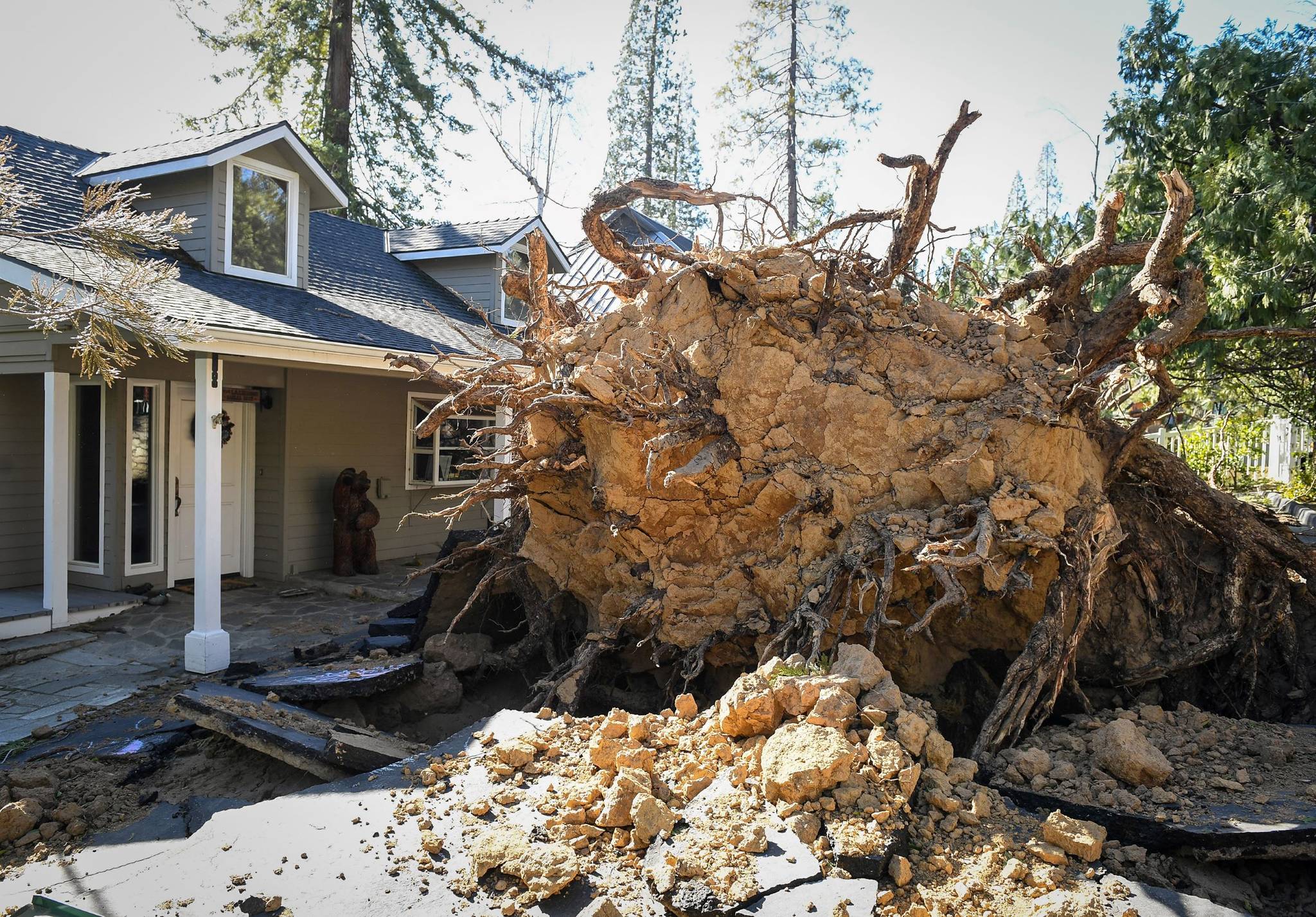FRESNO, Calif. — Lindsay Stevenson was in a camper van in the Yosemite National Park community of Wawona earlier this week when strong winds toppled hundreds of trees, snapping trunks in half and ripping roots out of the ground.
She said her husband, a U.S. Army veteran, described the wind event as “100 times worse” than the Afghanistan War.
When the sun rose Tuesday morning, a “total war zone” was revealed following a terrifying night of nonstop crashing sounds.
Powerful winds here, known as Mono winds, aren’t unfamiliar to those living in the Yosemite area. But this time, wind speeds reached higher-than-normal levels — in some places, over 100 mph — and resulted in unprecedented, widespread devastation. Hundreds of trees in the Sierra Nevada were toppled Monday night into early Tuesday, and dozens of homes and vehicles were crushed in rural mountain towns.
Yosemite National Park remains closed as a result of the wind damage. Park spokesman Scott Gediman said the park hopes to reopen Tuesday, but Yosemite’s south entrance via Highway 41 will be closed to visitors past that date for safety reasons as crews work to repair downed electrical lines. All areas south of Yosemite Valley will also remain closed until further notice. Damage assessment continues in the park.
Gediman called the Mono winds’ event the park’s biggest in terms of wind speed and damage caused over his 25 years in Yosemite.
Much of the damage was reported in Mariposa and Madera counties. Wawona, and Bass Lake farther south, were among communities hardest hit.
Many residents were still without electricity late in the week and scrambling to patch up damaged roofs ahead of this weekend’s rain and snow. No injuries have been reported in Yosemite and its surrounding communities from the wind event.
Mariposa County Sheriff Jeremy Briese, also the county’s director of emergency services, issued a local emergency proclamation on Tuesday requesting state and/or federal assistance.
“Businesses were already in an emergency situation and revenue is already drastically impacted due to COVID-19,” said Mariposa County Economic Development Specialist Tara Schiff, “so this disaster just adds one more layer of financial stress.”
Resident Steve Arata said there was “total devastation” in Bass Lake and he hopes his community gets more help soon.
“The governor needs to get here and declare a state of emergency,” Arata said Tuesday, “because there’s at least 40 homes that are destroyed with trees. … There’s multiple gas leaks. Thank God we don’t have a big fire or an explosion right now.”
The Mariposa County Sheriff’s Office shared a number of resources on its Facebook page for those affected by the wind event. The office reported Tuesday that trees and debris were across most roadways.
Wheeler said a sheriff’s report he received Thursday night showed 68 homes damaged by the wind event just in the Bass Lake basin, with two a total loss and eight of them 60 to 70% destroyed.
Madera County Sheriff Tyson Pogue shared this warning: “Based on everything going on right now, including risks from falling trees, severe weather, and strained resources, we are urging our citizens and visitors to consider staying home out of the weather this weekend.”
Stevenson, a native of Florida, said the wind event in Wawona was “very reminiscent of hurricanes — with a bunch of trees thrown into the mix.” But there was no rain Monday night.
Some roofs in Wawona were sheered off by the force of the winds, Stevenson said. She called parts of Wawona “unrecognizable” now.
The van that she and her husband, James Stevenson, hunkered down in emerged unscathed, but her Honda Element was crushed by a tree. The couple eventually sought shelter from crashing trees in Wawona’s Pine Tree Market, owned by friend Michael Henderson.
Winds damaged market property and the Hendersons’ home beside it. A tree that fell punched a handful of holes in the roof of their house, which are now covered with tarps. Snow started falling in Wawona on Friday afternoon.
Henderson called cleanup and repairs already done by workers and residents “miraculous.” Wawona is still a “train wreck,” he said, but much better than what it looked like Tuesday morning.
Wheeler said rental properties his fiancée owns were hit by fallen trees. The house they were at together Monday night in Ahwahnee wasn’t struck, but they were “scared to death.”
“It sounded like a freight train,” Wheeler said of the wind. “It sounded like thunder rolling. It was like an earthquake coming in the distance from miles away. It shook our house.”
Wheeler has spent his life in the mountain area and said the last big comparable wind event was in 1979.
Kent Tracy, owner of Advanced Tree Service based in Oakhurst, offered free emergency services Tuesday clearing driveways and cutting pines and oaks off cars and roofs.
He said it was most damaging wind event he’s seen over 30 years in the mountains. He said the damage is widespread, and trees fell in places as low in elevation as Coarsegold. Many that toppled were green and healthy, not just those hit hard by drought, bark beetles and fires. Tracy said the bigger, bushier trees caught the wind like a sail. He saw a mix of snapped and uprooted trees.
Stevenson said Yosemite’s historic Wawona Hotel, which has been closed since last year for repairs, and the nearby Pioneer Yosemite History Center buildings didn’t appear to be damaged, except for a horse corral.


